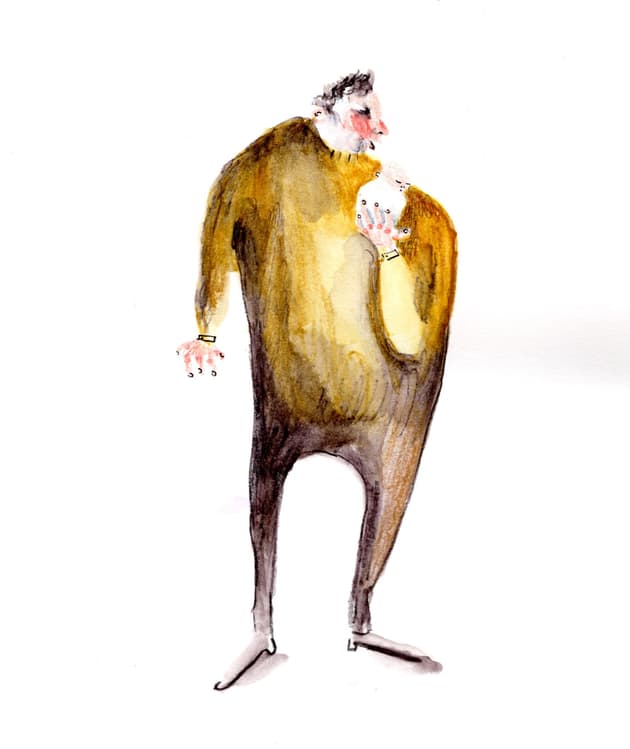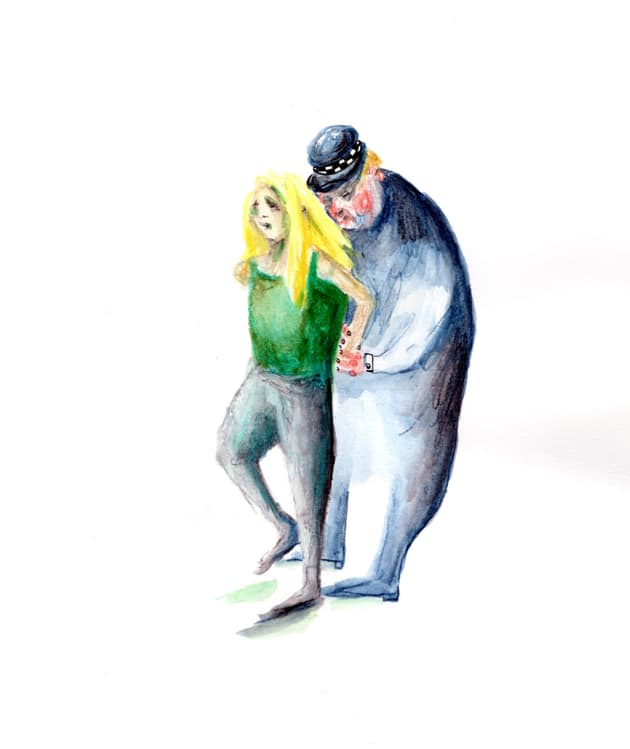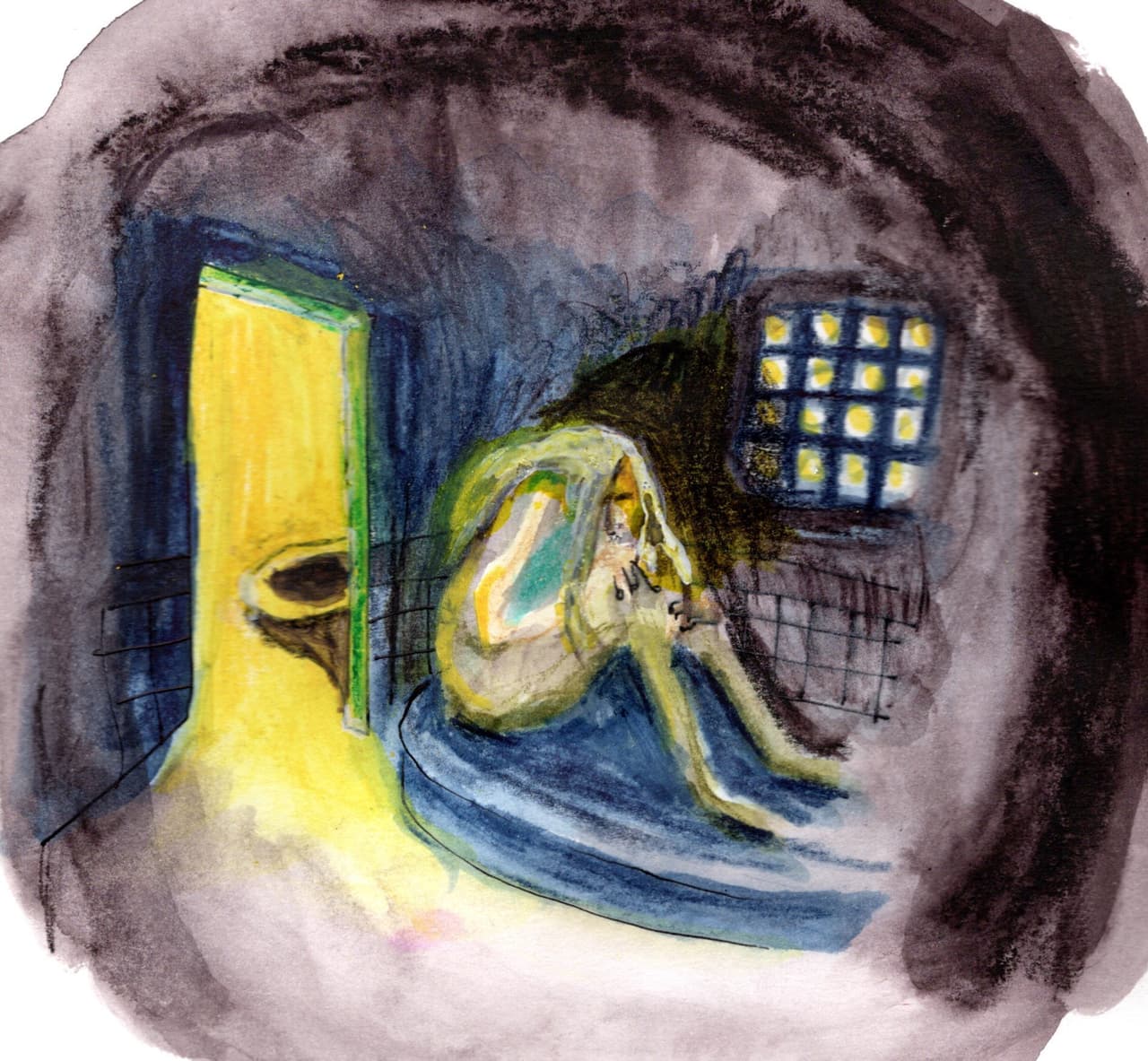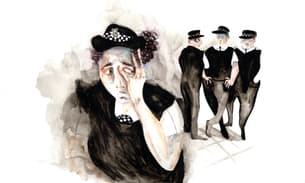
She split up with a cop. Then he had her arrested
At 2.45am one night in 2016, Tracy's father was woken up by torch lights darting around his garden. Then there came an urgent thumping on the front door. He went downstairs to find police officers on his porch. They were looking for Tracy. They said they wanted to arrest her for harassment.
“I’d sent something like 10 messages in seven days,” Tracy, whose name has been changed, told the Bureau of Investigative Journalism. She had been texting her ex-partner, an officer with Greater Manchester Police (GMP), because he had not been allowing her any contact with their young daughter.
When the police called at her parents’ house, Tracy was in fact staying with her sick grandmother more than 50 miles away. So the following night, officers from GMP paid that house a visit instead. They arrested Tracy just after midnight. Her grandmother collapsed soon after and had to be seen by paramedics, Tracy believes due to shock.
It was not the first time Tracy had been arrested, she said. It was the latest in a series of incidents that she feels her ex-partner had sought to orchestrate, using his position as an officer with GMP, to intimidate her by getting her in trouble with police. She sees this as a form of coercive control only available to a police officer.
“I believe his use of the law and the system, and his knowledge of police procedures, has made him able to do things, and the police have taken him more seriously because he was a police officer,” Tracy said. When she once threatened to report her ex-partner to the force over concerns about his behaviour, she said he replied, “I am the police”.
Tracy feels some police officers responded to her ex-partner’s allegations against her with undue severity because he was a police officer. She said she was arrested 10 times in four years. Two of these occasions led to convictions.
GMP later failed to take disciplinary action against him, she believes. The force found in a misconduct investigation that he had given “factually incorrect” and incomplete information to courts and to police, knowing it would likely lead to Tracy's arrest, but the force said he had no misconduct case to answer because he had not been acting in the course of his job as a police officer when the events occurred.
The Victims’ Commissioner, Vera Baird, said GMP’s reasoning was not acceptable. “Stories such as this one bring the police into disrepute,” she said. “It is breathtaking that victims in this position are often sure, as this one is, that they have been treated badly by police for complaining against one of their own. They see their adversary protected, as in this case, where the police hierarchy failed to impose even a disciplinary penalty... A victim has nowhere else to go for help but their local police force.”
Tracy's story follows the Bureau’s reporting on the experiences of those abused at home by police officers. Multiple women told us their abusive officer partners had misused their professional positions to further intimidate or harass them. Accounts included the stalking of an ex-girlfriend in a marked police car; threats of police loyalty and getting the women “put in prison”; and provoking and then recording the women at home, suggesting it would later be used against them.
Nearly 100 women from around the UK have come forward to share experiences of domestic abuse by partners in the police. In an attempt to force action, lawyers from the Centre for Women’s Justice (CWJ) have launched an official “super-complaint” about forces’ handling of such allegations, covering all forces in England and Wales. The complaint, which police regulators are now investigating, calls for changes in forces’ procedures, such as appointing another force to investigate allegations and automatically bringing in the Independent Office for Police Conduct for oversight.
There is no suggestion Tracy reported her ex-partner to any police force for domestic abuse. Yet she feels his use of legal and policing systems against her was a form of emotional abuse – only available to a police officer – from which she is only now starting to recover.
The Bureau shared her case with CWJ’s lawyers who in turn alerted the Greater Manchester deputy mayor for policing, Bev Hughes. She told us she had raised concerns with GMP’s chief constable and that discussions about the case were ongoing.
Hughes said she had also asked GMP to review the wider issues raised in the nationwide super-complaint and that the force has since developed a detailed action plan in response. “Retrospective examination of criminal investigations has also taken place to scrutinise investigations, decision-making and to identify any learning that can be done,” she said.
“I am very clear that allegations of police perpetrated domestic abuse must be effectively and appropriately investigated, just the same as for any other member of the public. I understand that Her Majesty’s Inspectorate of Constabulary will commence an investigation into the super-complaint shortly and I welcome that investigation.”
Using legal mechanisms to abuse
Tracy told the Bureau her saga began in 2013 when she and her ex-partner were still together. “He called me a ‘fat bitch who couldn’t even get having a baby right’,” she said of an argument after their daughter’s premature birth. “So I slapped him across the face. He rang the police because he said I needed teaching a lesson.”
GMP arrested her for the first time and kept her in a cell overnight, then released her with no action, she said. “That was the beginning of hell, a situation I thought I would never get out of.”
The couple split up and their young daughter lived with her father. Soon after, Tracy said, she was served with her first court order.
“At 6am there was a knock on the door, and a man from the court handed me a ‘non-molestation order’,” Tracy said. It transpired her ex-partner had taken the injunction out against her, and it meant she could be arrested if she contacted him.
“I went to a solicitor who said we’d challenge it. But in the interim I sent him a message saying ‘I’m sorry, please let me see [my daughter]’, because he was withholding her,” she said. “A week later there was a knock at my mum and dad’s door at 7am and it was the police to arrest me for it.”


This, Tracy told us, set the pattern for her ex-partner’s behaviour: in her view misusing his legal and policing knowledge to emotionally abuse her by getting her in trouble with the police. Over the following six months, she said, she was arrested four more times on his reports to the police of her breaking the injunction.
“What woman separated from her baby wouldn’t look at a piece of paper and break it to see her baby?” Tracy said. “I don’t believe any woman on Earth wouldn’t break it.”


Two of these arrests led to her spending the night in police custody. “Twelve hours. That was a long, long time,” she said. She got so used to time in police cells that she would take some books to read, she said, but this did not eradicate the “feelings of panic, like the walls are closing in”.
A few years later, her ex-partner’s pattern of behaviour started all over again. When he was looking after their daughter he would block Tracy's contact with her, so she would text and email him. He would then report her to GMP for harassment, without telling the police why she was contacting him.
This led to the 2.45am visit to Tracy's parents’ house, and the midnight arrest at her grandmother’s home the next day. The police de-arrested her that night when she said she could not leave her sick grandmother; when she voluntarily attended a police station the next day, they arrested her again. She spent eleven hours in custody before being released with no further action.
Tracy told us she never thought she would end up in a police cell. “Before ... I had a good flat, a good job, a good social life, then my life was turned upside down,” she said. “I just felt hunted.”
She described how her self-esteem was eroded and she had no voice to push back on the injunctions or allegations being made against her. “I had police and social services all saying ‘you are the abuser and [your ex-partner] is the victim’.” She said she felt they were publicly saying they understand coercive control but not looking adequately at the evidence in this instance.
She was in constant fear of the police and said at times she felt suicidal. “Eventually I got to the point where I thought I’m either going to die or I’m going to have to stand up for myself,” she said. “So I started writing the police letter after letter.”
Honesty and integrity
Tracy’s letters of complaint led to GMP undertaking an internal misconduct investigation. The resulting report stated that her ex-partner had twice failed to tell the police, when reporting Tracy for harassment, that she was contacting him because he had not let her speak to their child.
It also said he had “failed” to tell this to a court in a sworn statement, when successfully applying for a second injunction against Tracy for harassment.
The report found that Tracy's ex-partner would have been aware, “with his knowledge of police procedure” that withholding key information from both the court and police would most likely lead to her arrest.
Systemic failings. Abuses of power. Corruption.
There’s no quick fix but our investigations are fuelling the engine of change. You can help us do more.
Yes! I’ll support the BureauThe injunction, it said, “had a power of arrest which [Tracy's ex-partner] would then use … against her … by reporting her to the police”. He did exactly that, which led to what Tracy says was her 10th arrest.
GMP concluded, however, that he had no misconduct case to answer. “His actions were carried out in his capacity as a private individual in his own time and not in his capacity as a police officer and although his personal actions might discredit him, they do not discredit the police service as a whole,” the report stated.
Kay Neve, a former detective constable with Kent police who worked on professional misconduct and domestic abuse cases, disagrees with GMP’s conclusions. She told the Bureau that she would think a member of the public would be very concerned if they found a police officer had given factually incorrect information in a court statement. She added that in her view continuing as an officer in such circumstances would usually be untenable.
“How can you then, with any degree of confidence, allow that police officer to end up in a magistrates’ or crown court and be 100% guaranteed that what they are saying under oath is the full truth?” she continued. “It questions the very integrity of that person to the extent it could potentially bring discredit on the force.”
Tracy's ex-partner eventually resigned while under investigation. The Crown Prosecution Service (CPS) decided not to charge him for perverting the course of justice.
GMP told the Bureau it would be inappropriate to comment on the case in detail. “[Tracy’s] complaint was investigated by GMP’s Professional Standards Branch with evidence sent to the CPS for their consideration. The rationale for there being no criminal, or disciplinary action taken against any party can be found in the investigation report sent to [Tracy].”
Other officer involvement
Tracy believes some officers may have treated her more harshly than usual because the person making the accusations against her was an officer; she feels she was subjected to “nothing short of harassment by the police”.
On what Tracy described as the worst day of her life, she was with her daughter at a friend’s house. She had been drinking and told the Bureau she had planned to stay the night, but said she then got a call from her ex-partner asking her to drive their daughter back to him.
“He said if I didn’t get her back to the house he would send the police round. There was always the threat of the police believing him,” Tracy said. By this point, she had already been arrested six times – including five times for breaking the injunctions he had taken out against her – and convicted in a magistrates’ court of breaching the orders and assaulting him (which she says she now plans to appeal).
“I put her in the car and to this day, I don’t know why I did that… why didn’t I just ring a taxi?” she said. “You can judge me, because this is just the worst thing ever... I don’t ever try to excuse or defend it.”
Tracy said when she arrived at his house, officers from Lancashire police were waiting with her ex-partner for her to arrive. They arrested her and she was later convicted of drink-driving.

A Lancashire constabulary spokesman said: “Lancashire constabulary expects the highest standards of professionalism and integrity from all our staff. The vast majority of our staff adhere to these standards, including adhering to correct decision-making and legal constraints, no matter who the informant may be. We take great pride in delivering a first-class policing service every day.”
Tracy feels her ex-partner’s allegations were handled differently by the police than if he had been an ordinary member of the public. She said GMP made no effort to contact her or ask her to attend a police station voluntarily before officers went to her parents’ house at 2.45am to arrest her.
“I don’t believe, if he’d been a civilian, that the police would have taken such a heavy-handed approach,” she said.
Neve said the fact the GMP officers de-arrested Tracy that night so she could care for her grandmother suggested they did not need to arrest her in the middle of the night in the first place.
“By [de-arresting her] they obviously trusted she would present herself to a police station voluntarily, because their other option would have been to ring round and get somebody else to sit with the grandmother,” she said.
The GMP report considered whether there was collusion between Tracy’s ex-partner and other officers “to control and intimidate her”. It concluded the officers had “done nothing wrong”.
“I have lost that part of her childhood”
Seven years after she was first arrested, Tracy finally lives with her daughter again. She said she is only now starting to recover from her ordeal.
“I’ve been arrested 10 times over the course of these events. And I believe one of them I deserved, that was the drink-driving. None of the others I deserved. I slapped [my ex-partner] in 2013 and from then my life just fell away. That has given him so much power.”
Tracy told us she was separated from her young daughter for a year in total throughout the saga. “I just existed,” she said, claiming that once her ex-partner did not let her speak to the child on her birthday. “She thought her mummy didn’t want to speak to her.”
“There are not many types of psychological abuse worse than not being able to see a child.”
She said that in her view, “you read over and over again about women being abused by men and the police don’t do anything,” she said. “And there’s a police officer here who, it seems to me, utilised injunctions as a tool to try to abuse me, and the slightest reaction I then had, I got arrested for. ”
In her eyes, the failure to discipline her ex-partner has left him emboldened to continue discrediting her. Months after GMP closed its investigation, he told a third party through Facebook that she was a domestic abuser with cautions for breaking injunctions but that he, on the other hand, had “never been arrested, cautioned or convicted of any offence”.
When the Bureau approached him for comment he vehemently denied all the allegations in this article. He said he had never been arrested, charged or convicted “by the police or any other authority for any of the allegations she has made”, adding that meanwhile Tracy has been convicted of assault, breaching injunctions and drink-driving.
He also disputed the GMP report. “I was unhappy with the content of the report as it is factually incorrect,” he said. “I was not found guilty of any offences and not subject to any disciplinary action.”
Tracy is planning to try to appeal her assault conviction, and otherwise she is trying to move on with her life, reunited with her daughter.
“I don’t have a lot of memories of her. I have lost that part of her childhood, but I try not to dwell on it,” she said.
“I just want to be a normal mummy, picking her up from school, giving her her tea.”
Tracy’s name has been changed for legal reasons
Illustrations by Danny Noble for the Bureau of Investigative Journalism.





